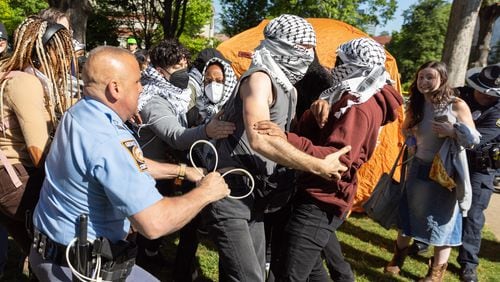The Rev. Rey Pineda celebrates Mass with fellow Catholics in Atlanta. He officiates at their weddings. He baptizes their children. And he ministers to them when they crawl into their deathbeds.
Now he is in the middle of the national debate over whether “Dreamers” such as him should stay or go. Pineda, 29, may be the only Catholic priest in the United States who has been granted a special reprieve from deportation through an Obama-era program for young immigrants who were brought here as children.
Pineda’s story provides a window into the thorny issue Congress is about to take up as it seeks to avert another government shutdown. Many Republicans belong to the Catholic Church and follow the pope, who has spoken out in favor of preserving the Obama administration’s Deferred Action for Childhood Arrivals program, or DACA.
Related: Georgia feels the pain from federal government shutdown
President Donald Trump announced Wednesday that he could support creating a pathway to citizenship for DACA recipients, though he recently rejected a bipartisan plan that included such a measure. At the same time, Trump is asking for $25 billion for a new wall on the southwest border, a project vehemently opposed by many congressional Democrats who see it as a colossal waste of money.
Meanwhile, a majority of white Catholics — 71 percent — support granting permanent legal status to Dreamers such as Pineda, according to a Pew Research Center poll released this month. That number rises to 92 percent for Hispanic Catholics.
Related: Report: 15,700 DACA recipients in the Atlanta-Sandy Springs-Roswell area
Allen Kinzly, a Republican who voted for Trump, calls Pineda a friend and sometimes celebrates Mass with him at the Cathedral of Christ the King in Atlanta. They go bowling and watch Atlanta United FC soccer games together. Getting to know Pineda has helped put a human face on the issue for Kinzly. The Marietta resident wants Congress to create a pathway to citizenship for DACA recipients.
“It really kind of personalizes it,” Kinzly, a multimedia specialist for the Roman Catholic Archdiocese of Atlanta, said of his friendship with the priest. “It really makes you think: ‘This can affect me now, not just him.’ If he gets deported back to Mexico, now I lose a friend.”
Other Catholics hold different views. For example, Republican state Sen. Joshua McKoon of Columbus, an outspoken critic of illegal immigration who attends the cathedral in Atlanta and got married there, agreed with Trump's decision last year to phase out DACA. The Obama administration created DACA in 2012 after Congress failed to pass a bipartisan overhaul of the immigration system. McKoon saw President Barack Obama's move as an illegal — and "grossly irresponsible" — end run around federal lawmakers, though the president has said his action was based on a well-established legal principle of prosecutorial discretion, used by both Republican and Democratic presidents.
“Those of us who are concerned about enforcement of the law,” McKoon said, “have a real skepticism about any solution that is going to say, ‘Well, first we are going to grant a blanket amnesty to hundreds of thousands — or maybe even millions — of people without doing anything about securing the border or assuring that this problem does not reoccur.’”
Like Trump, McKoon supports switching to a “merit-based” immigration system, or one that would prioritize job skills over family ties. The senator said he is sympathetic toward Pineda and could support creating a legal channel for immigrants such as the priest to come to America when there are shortages of clergymen. The number of Catholic priests in America has plummeted by more than one-third since 1965 to 37,181, according to the Center for Applied Research in the Apostolate.
“I think it is very easy for those on the left to sort of demagogue this issue and say it is not congruent with your faith tradition,” McKoon said. “Whether you come from a Christian perspective on this or not, I think most Americans want to have a welcoming policy that allows people to pursue their American dream. But I think that reasonably minded people will say, ‘We have got to balance the competing interests here.’ ”
Pineda is among 21,600 DACA recipients in Georgia and 689,800 nationwide, federal records show. His DACA status — which includes a temporary reprieve from deportation and a permit that allows him to work for the Catholic Church — is set to expire in March of next year. Catholic Legal Immigration Network Inc. and the United States Conference of Catholic Bishops said they were unaware of any other DACA recipients serving as Catholic priests in the United States.
Atlanta Archbishop Wilton Gregory is speaking out in support of Pineda.
“Like so many Dreamers, Father Rey is a blessing, not a burden, to our society and to this archdiocesan church,” Gregory said in a prepared statement, “and he has worked so hard just to be able to live his life in sacrificial Christian service to the rest of us. For his sake and for that of so many others, I pray that our elected officials find a way to address the challenges of a comprehensive immigration solution that will preserve our cherished heritage of being a generous, compassionate, and welcoming nation.”
Pineda’s parents brought him to California when he was an infant after his mother was seriously injured in a car wreck, seeking to raise money for her medical bills. They ultimately decided to stay in America and moved to Georgia to find work during preparations for the 1996 Summer Olympic Games. Meanwhile, their hometown in Mexico became beset by drug violence and corruption.
Pineda graduated from Our Lady of Mercy Catholic High School in Fayetteville and then Southern Catholic College in Dawsonville before becoming an ordained priest four years ago. While he supports creating a pathway to citizenship for immigrants such as him, he isn’t didactic about it. Instead of preaching about immigration politics in the church, Pineda generally encourages love and compassion.
In the middle of last weekend’s government shutdown, Pineda celebrated Mass in Atlanta before hundreds of parishioners, most of whom were Hispanic. Wearing green and gold vestments, Pineda first spoke in Spanish and then in English, discussing St. Paul’s teachings about the Resurrection.
“You have to find strength to believe that this is not the end — that there is more to this life,” he said, addressing the many children in the sanctuary. “When people hurt other people, when people discriminate against others, when people treat others like they are less than they are, what is happening is those people believe this world is all that there is. If they believed there was an eternity, it would be very different.”
“We have to dig deep and continue to love, even when things are difficult, even when it is hard to love another person, even when it is hard to forgive people for the things they do to us,” Pineda continued. “We have to dig deep and love because that love is truly what is going to change the world. And we are going to begin to see things not upside down but truly as God always meant them to be.”
“Amen?” Pineda asked.
“Amen,” the worshippers responded.
Never miss a minute of what's happening in Georgia Politics. Subscribe to PoliticallyGeorgia.com.
About the Author







